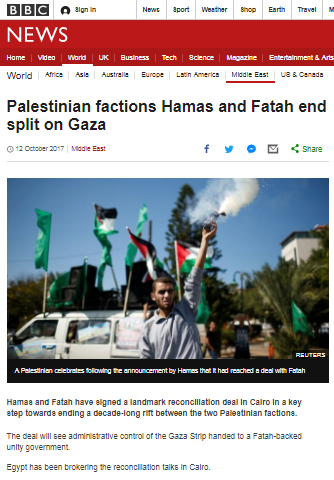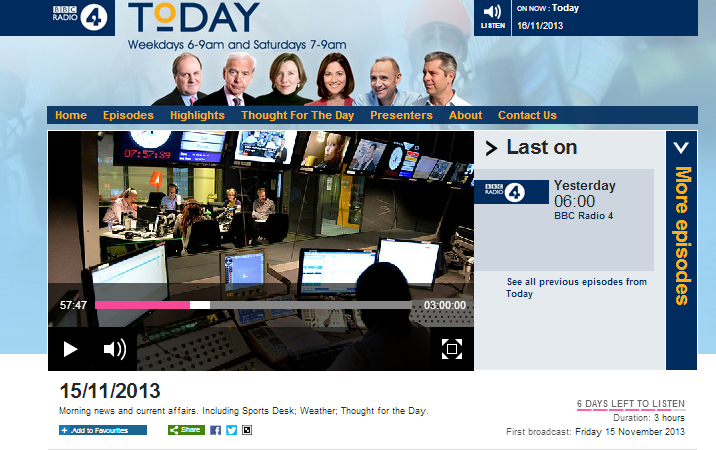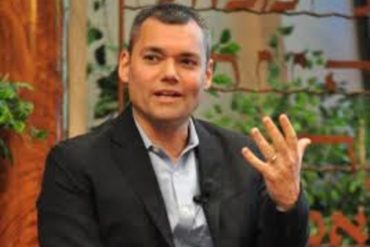The announcement of a preliminary agreement between Hamas and Fatah on October 12th was the subject of a long report that appeared on the BBC News website’s Middle East page under the optimistic headline “Palestinian factions Hamas and Fatah end split on Gaza“.
“Hamas and Fatah have signed a landmark reconciliation deal in Cairo in a key step towards ending a decade-long rift between the two Palestinian factions.
The deal will see administrative control of the Gaza Strip handed to a Fatah-backed unity government.
Egypt has been brokering the reconciliation talks in Cairo.”
Over 20% of the report’s word count presents background to the decade-long rift between Hamas and Fatah but readers found very little concrete information concerning the terms of the agreement which is the article’s subject matter.
“On Thursday, negotiators said the new deal included the handing over of control of the Rafah border crossing between Gaza and Egypt to the Fatah-backed government, which will be handed administrative responsibilities by December.
The Palestinian Accord Government said it will also station forces in the Gaza Strip by December “at the latest”.” […]
“Fatah’s lead negotiator, Azzam al-Ahmad, said the plan was to “carry on implementing all the clauses of the agreement, especially those related to solving the crisis of the [Gaza] employees”.
Tens of thousands of civil servants employed by the Palestinian Authority have been out of work since Hamas took control of the Gaza Strip in 2006.” […]
“Earlier this month, Hamas allowed the Ramallah-based Palestinian government to take over public institutions in Gaza as part of a reconciliation process between the two rival administrations.”
The BBC’s report did not clarify to readers that the many issues still to be agreed upon between Hamas and Fatah include the fate of Hamas’ own civil servants. Another major point yet to be resolved is of course the fate of Hamas’ armed militia. The BBC’s 817 word report devoted just 25 words to that topic:
“However, the fate of Hamas’ security forces and 25,000-strong military wing, has been one of the thorniest issues preventing reconciliation and remains to be resolved.”
In line with the usual editorial policy, the report made no effort to inform readers why that issue is crucial not only to ‘reconciliation’ between the two factions but also to meeting the Palestinian Authority’s obligations under existing agreements as well as to the future of negotiations between the Palestinians and Israel. Readers would hence have been unlikely to fully understand the selected quoted comments from an Israeli spokesperson.
“In response to Thursday’s announcement, an Israeli government official said that any unity deal “must include a commitment to international agreements”, adding that Hamas must disarm and recognise Israel.”
Despite the BBC having refrained from reporting the appointment of US Treasury designated Saleh al Arouri to the position of deputy leader of Hamas’ political bureau earlier this month, a photo caption in this article indicates that the corporation is aware of his new position.
“Fatah’s Azam al-Ahmed (right) and Hamas deputy head of the politburo Saleh al-Aruri sign the agreement”

Although the BBC’s report featured comment on the agreement from a variety of sources including Hamas’ Salah Bardawil and Sami Abu Zuhri, readers were not informed of comments made by the man who actually signed it on behalf of Hamas.
“Speaking after the agreement was signed, Arouri, who headed the Hamas delegation that negotiated the deal, said Palestinian unity was vital “so that we can all work together against the Zionist enterprise, which seeks to wipe out and trample the rights of our people.””
In the past BBC audiences have often seen unhelpful reporting on the subject of the electricity crisis in the Gaza Strip: reporting which has not only failed to provide a clear and factual explanation of the reasons behind that crisis but on occasion has even steered audiences towards the inaccurate impression that it is connected to Israeli counter-terrorism measures along its border with Gaza. This latest BBC report unfortunately continues that policy of promoting inaccurate information:
“Since 2006, the two countries [Egypt and Israel] have maintained a land and sea blockade on Gaza in an attempt to prevent attacks by Gaza-based militants. The measures have also aggravated electricity and fuel shortages.” [emphasis added]
Once again we see the BBC making do with superficial presentation of the Hamas-Fatah unity deal story that fails to meet its obligation to provide reporting “of the highest editorial standards so that all audiences can engage fully with issues”.
Related Articles:
BBC News sidesteps the topic of Hamas disarmament yet again
BBC fails to clarify to audiences significance of PUG failure to disarm Hamas
Superficial BBC reporting on Hamas-Fatah ‘unity’ returns
The BBC World Service’s Hamas-Fatah ‘unity’ binge – part one
The BBC World Service’s Hamas-Fatah ‘unity’ binge – part two
The BBC World Service’s Hamas-Fatah ‘unity’ binge – part three
BBC’s Bateman misleads on US and Israeli approach to Hamas-Fatah ‘unity’




